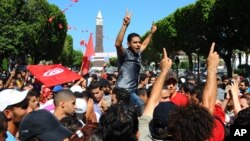Protests have erupted in Tunisia after the killing of outspoken opposition leader Mohamed Brahmi outside his house in the capital, Tunis, the second political assassination in the country this year.
Unknown gunmen shot Brahmi - who belonged to the nationalist and secular Popular Front party - several times early Thursday.
The 58-year-old politician was a vocal critic of Tunisia's Islamist-led government and a member of the Constituent Assembly charged with drawing up the North African country's new constitution.
After the killing, thousands of people protested outside the Interior Ministry in Tunis and a hospital where Brahmi's body had been taken. Similar demonstrations erupted in the southern town of Sidi Bouzid, the cradle of the Tunisian revolution, where protesters set fire to two local offices of the governing Ennahda party.
The moderate Islamist Ennahda, which rules in coalition with two secular parties, quickly condemned the killing.
The chairman of the Constituent Assembly said Friday will be a day of mourning for Brahmi. Tunisia's largest labor union, UGTT, called for a general strike the same day to protest Brahmi's death.
The February assassination of another secular politician, Chokri Belaid, ignited the worst violence in Tunisia since the 2011 fall of autocratic president Zine al-Abidine Ben Ali and provoked a political crisis that nearly derailed the country's political transition.
Brahmi's family and Tunisian rights activists swiftly charged that Ennahda was behind both murders.
The opposition has criticized Ennahda for not cracking down on Islamist extremists, and many members of Belaid's party hold the government responsible for his assassination.
Tunisian officials say six suspects sought for Belaid's assassination are still on the run and their names will soon be revealed.
Thursday's killing comes as Tunisia was celebrating the 56th anniversary of becoming a republic after gaining independence from France.
Unknown gunmen shot Brahmi - who belonged to the nationalist and secular Popular Front party - several times early Thursday.
The 58-year-old politician was a vocal critic of Tunisia's Islamist-led government and a member of the Constituent Assembly charged with drawing up the North African country's new constitution.
After the killing, thousands of people protested outside the Interior Ministry in Tunis and a hospital where Brahmi's body had been taken. Similar demonstrations erupted in the southern town of Sidi Bouzid, the cradle of the Tunisian revolution, where protesters set fire to two local offices of the governing Ennahda party.
The moderate Islamist Ennahda, which rules in coalition with two secular parties, quickly condemned the killing.
The chairman of the Constituent Assembly said Friday will be a day of mourning for Brahmi. Tunisia's largest labor union, UGTT, called for a general strike the same day to protest Brahmi's death.
The February assassination of another secular politician, Chokri Belaid, ignited the worst violence in Tunisia since the 2011 fall of autocratic president Zine al-Abidine Ben Ali and provoked a political crisis that nearly derailed the country's political transition.
Brahmi's family and Tunisian rights activists swiftly charged that Ennahda was behind both murders.
The opposition has criticized Ennahda for not cracking down on Islamist extremists, and many members of Belaid's party hold the government responsible for his assassination.
Tunisian officials say six suspects sought for Belaid's assassination are still on the run and their names will soon be revealed.
Thursday's killing comes as Tunisia was celebrating the 56th anniversary of becoming a republic after gaining independence from France.







